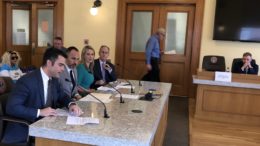Its radio transmissions encrypted since 2016, Aurora police considered — then rejected — a delayed public feed on Broadcastify
The radio scanners were vital tools of Robinson’s trade, tipping her off to police activities throughout the Denver metro area — information she corroborated by making those countless calls to her many, many sources. But they wouldn’t be so useful if Robinson were still reporting today.







